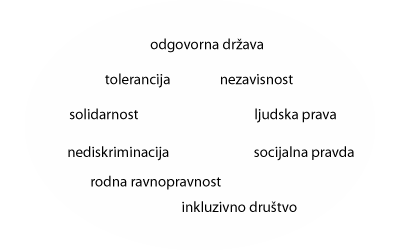Membership in networks and coalitions
Anti-Poverty Network - Serbia

Anti-Poverty Network – Serbia was founded as part of the SeConS initative within the project Networking Against Poverty which is supported by the European Commission. The Network was founded by ten organizations (SeConS, Autonomous Women Centre, Civic Initiatives, Group 484, Amity, Center for Independent Living of Persons with Disabilities of Serbia, Association for the Development of Children and Youth – Open Club, Educational Center of Leskovac, Sunce and Roma Information Center from Kragujevac) who recognized the need to take part in the fight against poverty and social exclusion in Serbia. The Network is open to all who are willing to actively contribute to the realization of the vision, mission and objectives of the Network. In June 2011, the Anti-Poverty Network – Serbia was admitted to full membership of the EAPN General Assembly in Lisbon and, by extension, joined 12 new member states. The establishment of the Network was supported by SIPRU.
The Network’s vision is Serbia as inclusive, supportive and solidary society where everyone has the opportunity to express and develop their potential and realize their rights to a quality and dignified life. In line with this, the Network operates in all areas where it can improve the quality of life of individuals and groups that have been attacked by poverty and to improve social inclusion processes in Serbia.
Within the Anti-Poverty Network – Serbia, a large number of activities have already taken place: workshops, trainings, exchange of experiences, learning from European partners, study visits, joint activities of lobbying and advocacy in the field of public policies –all of which are relevant to poverty reduction and the social inclusion of vulnerable groups.
https://www.facebook.com/ProtivSiromastva/
The European Anti-Poverty Network (EAPN)
was founded in 1990 and, today, it includes 27 national networks against that advocate against poverty and 23 European associations active in the EU member states and Norway. EAPN is working on creating a social Europe without poverty and social exclusion, where everyone will have access to economic, social and cultural rights.
The Anti-Poverty Network – Serbia values

Who should work on reducing poverty and social exclusion?
Policy-makers
Institutions
Profit Sector
Civil Society
Citizens
Cross-Border Citizens' Network for Peace, Inter-Communal Reconciliation & Human Security

The Cross-Border Citizens’ Network for Peace, Inter-Communal Reconciliation & Human Security is a joint initiative –with partner organizations in Bosnia and Herzegovina (hCa and ORC), Bulgaria (IRIS), Kosovo (CDRP), Montenegro (ZID), Serbia (SeConS) and Turkey (hCa in Turkey)– whose establishment was supported by the European Commission. Within the Network, each member approaches the issue on human security from different perspectives, therefore focusing on a particular aspect (local, civic, regional) and field of activities (advocacy, broader social mobilization, research). Their common denominator, however, is their aim to create security-oriented political culture and build structures within their communities.
The transnational nature of the threats to human security, in everyday life, have been identified through organized crime, poverty, social exclusion, extremism and the “gray” economy. Therefore, there is a need to strengthen regional and international connections of all stakeholders, research and advocacy communities and decision makers who strive to uphold the values of peace, reconciliation and human security.
Networking aims to strengthen sustainable transnational civic networks as an actor for the preservation of peace, inter-communal reconciliation and human security –at the local, national and regional level– in order to encourage, and improve, the socio-political and legal transformations in the process of European integration of the Balkans and Turkey. Specific objectives of the Network are:
- Building social capital
- Making recommendations for political reforms
- Networking on the local, regional and EU level
Within the Network, a series of activities are being conducted such as capacity building, networking, research, advocacy, the preparation of annual and thematic reports as well as the organization of regional and international conferences and summer schools for researchers in the field of human security.
From December 2012 to December 2016, SeConS has implemented the project Cross-Border Network for Peace, Inter-Communal Reconciliation & Human Security in cooperation with partner organizations whose primary focus is on the security of youth and people in the work environment followed by the application of research on the national and regional level and the implementation, and availability, of on-line courses on human security.
Open Parliament

Open Parliament is a joint initiative of civil society organizations consisting of the CRTA – Center for Research, Transparency and Accountability from Belgrade, the National Coalition for Decentralization from Nis, YUCOM – Lawyers’ Committee for Human Rights from Belgrade, the Zajecar Initiative from Zajecar and the SeConS Development Initiative Group from Belgrade. As part of the initiative, SeConS contributes valid and reasonable arguments to advocate for change in Parliament.
Open Parliament provides increasing visibility and accountability of the National Assembly as well as open communication between institutions and its citizens. This initiative serves to help citizens become more familiarized with the work of the Republic Parliament in order to eventually shift the dominant negative attitude of the Assembly, from a place of partisan-rooted interests and conflict to institution that works in the interest of its citizens. The coalition’s work is based on the values contained in the International Declaration on Parliamentary Openness.
Communication between citizens and their representatives is carried out through the internet portal www.otvoreniparlament.rs, where transcripts of parliamentary sessions are regularly published, various laws and amendments analyzed recommendations for improving the transparency of Parliament, information about the assets of MPs and various questions are addressed directly to the deputies.
Since 2011, when Open Parliament was established, two generations of Open Parliament students have been enrolled during which selected students from the Faculty of Political Sciences have had the opportunity to improve their knowledge about the theory and practice of parliamentarism and roles of civil society and, furthermore, acquire the skills necessary for conducting advocacy campaigns.
